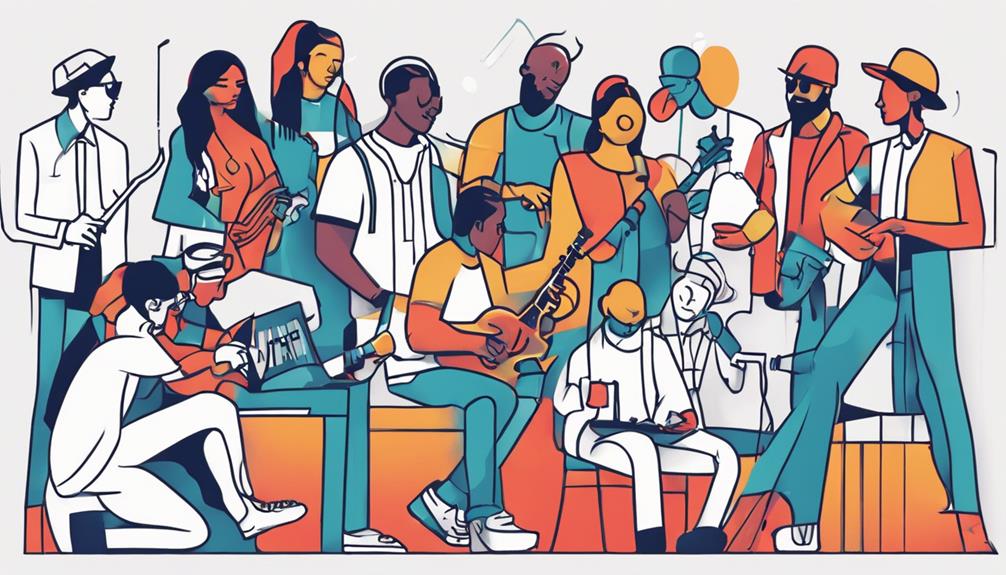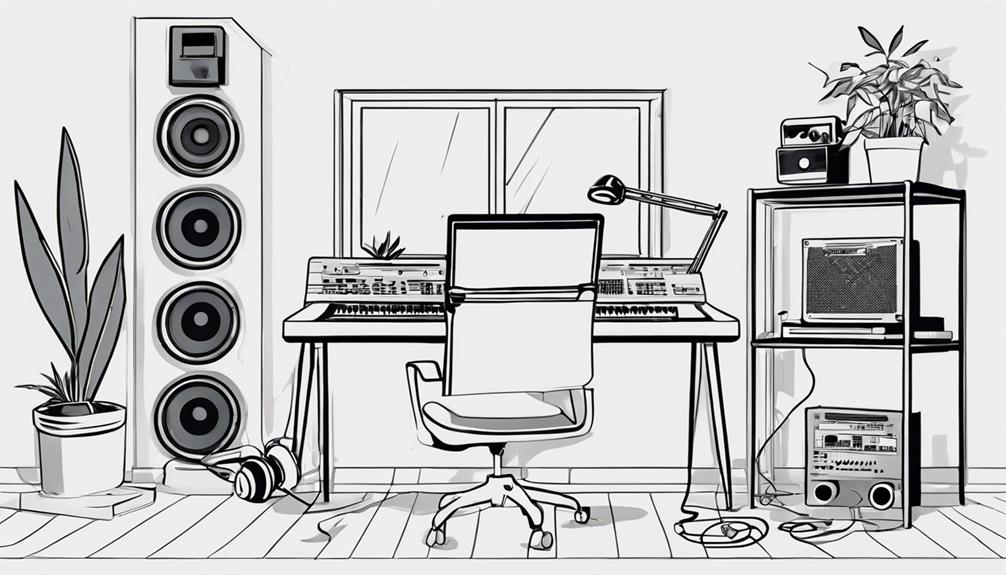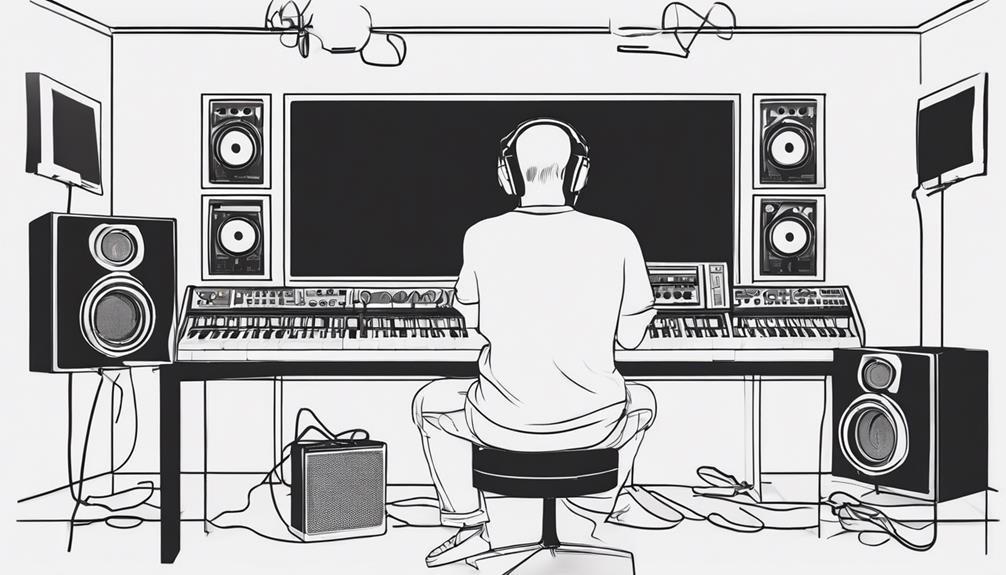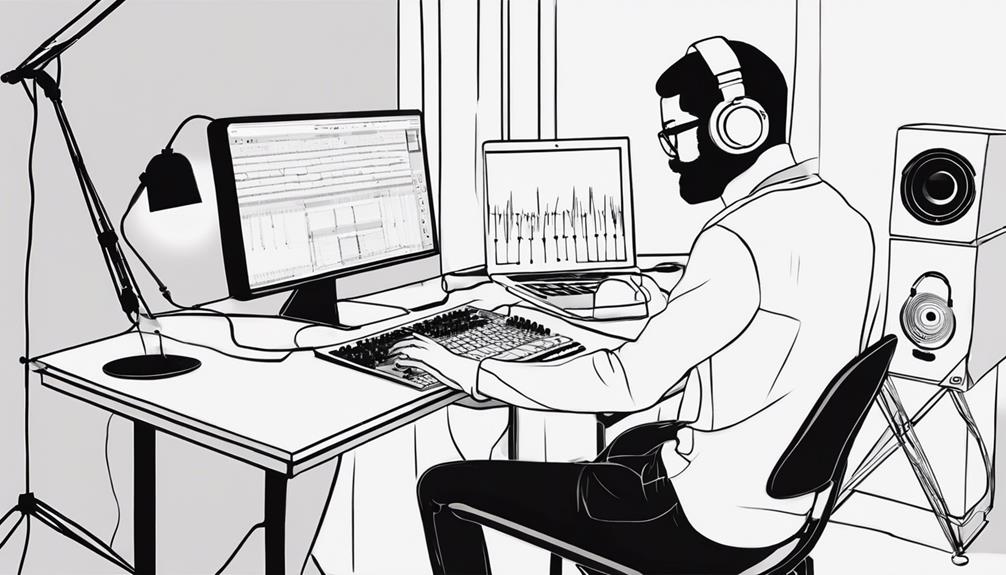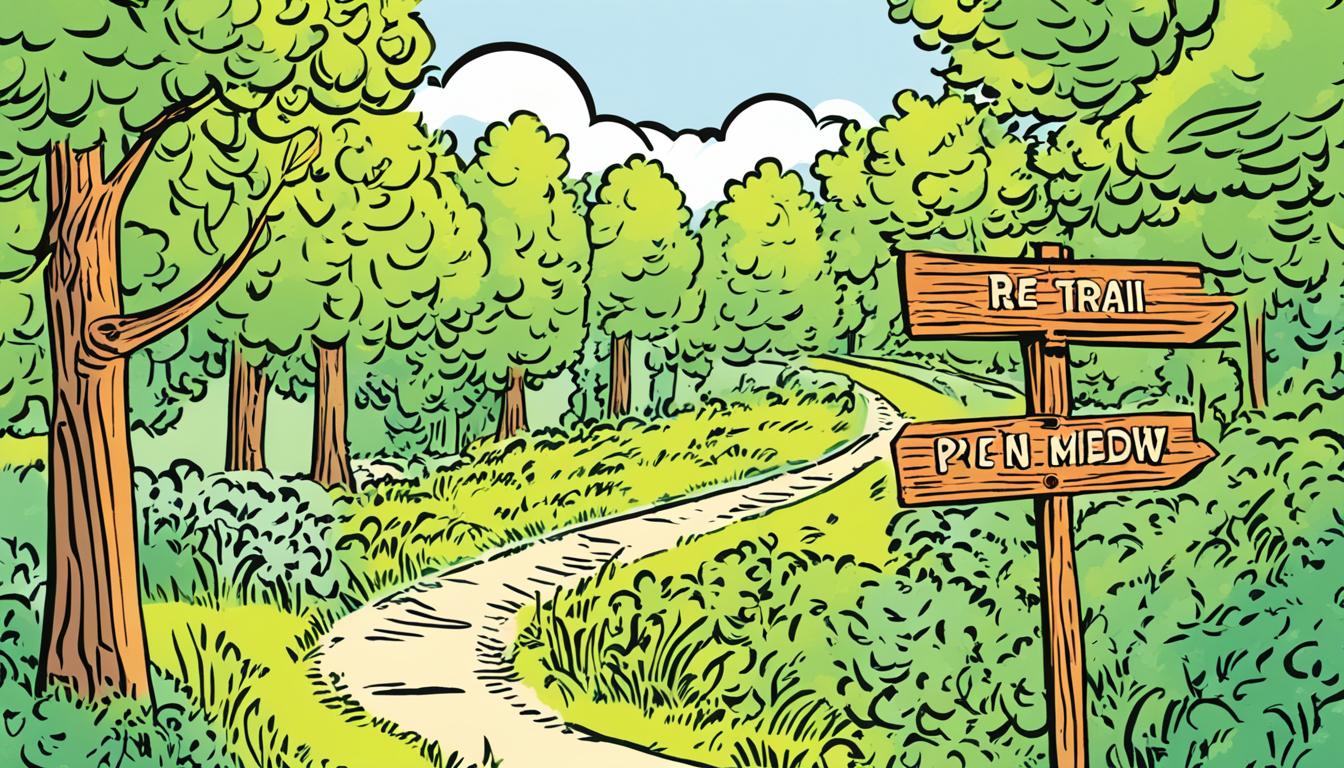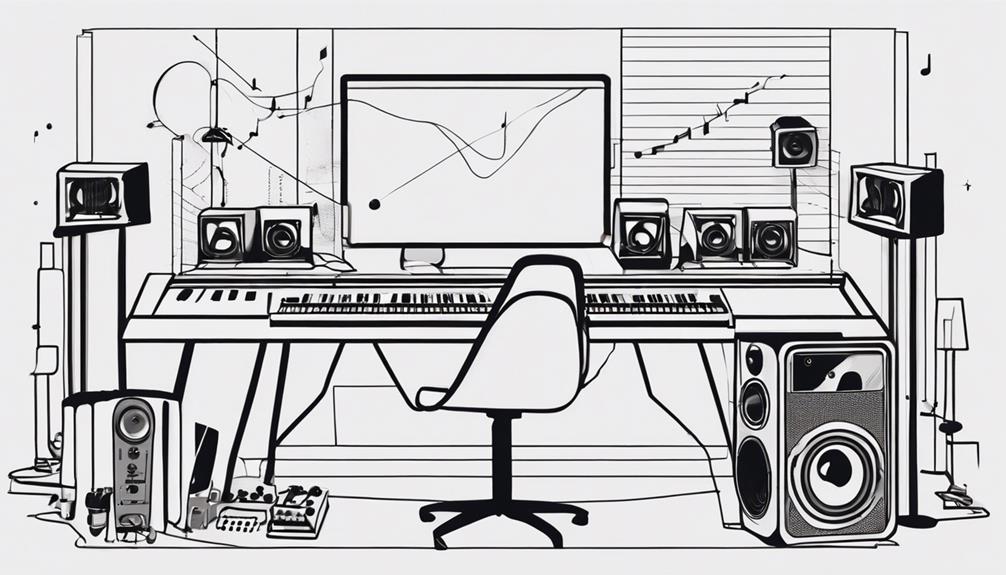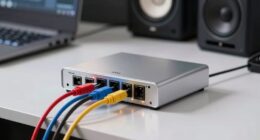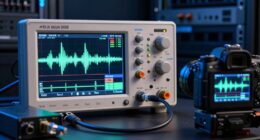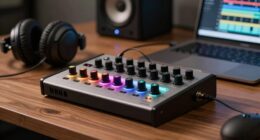Enhance skills and specialize in genres you love to attract clients with your unique style. Hone in on specific markets and position yourself as an expert to resonate with ideal clients. Research market rates and establish value to avoid underpricing. Showcase your work on a personal website with SEO practices for lead generation. Craft personalized pitches and engage with clients through testimonials. Collaborate with local artists, attend industry events, and join online music production communities for networking opportunities. By maximizing these strategies, you'll be on the path to getting more work in music production.
Key Takeaways
- Specialize in preferred music genres to attract clients who resonate with your style.
- Research market rates to competitively price services and offer value to clients.
- Utilize online platforms and social media for visibility and lead generation.
- Network with local artists, industry professionals, and agencies for client referrals.
- Tailor pitches and services to target ideal clients within specific music genres.
Develop Your Skills
To excel in music production, continuously enhancing your skills over a span of approximately 10 years is vital. Mastering this craft requires dedication to watching masterclasses, following mentors, and taking online courses to stay competitive within the music industry.
By specializing in genres that you're passionate about, you can attract clients who resonate with your unique style and also avoid burnout.
As you develop your skills, it's essential to identify your ideal clients within different music genres. Understanding the specific needs and preferences of clients within various genres will help you tailor your services and find new opportunities for growth.
Identify Your Market
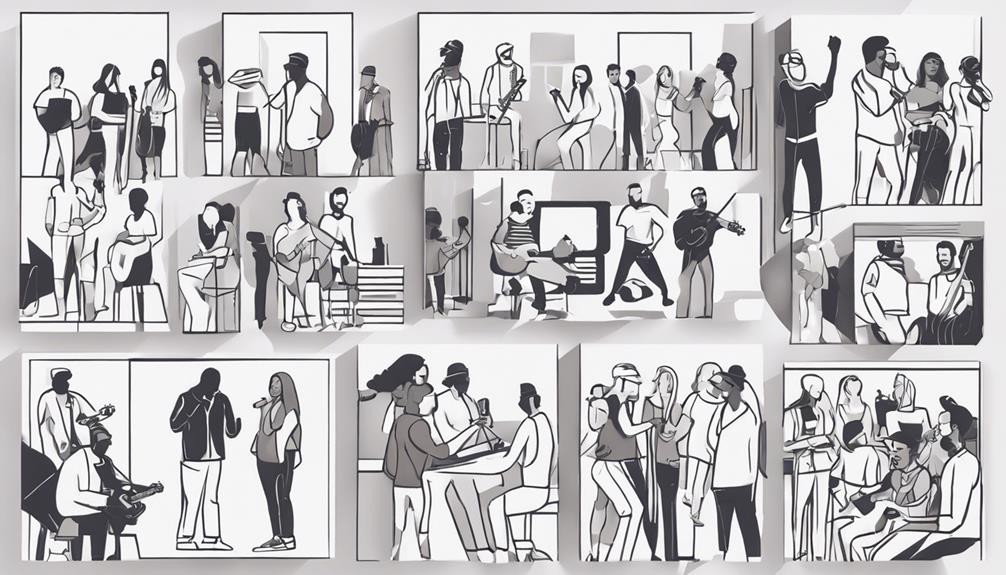
Identify your market by honing in on specific music genres or types of clients you're passionate about.
Research and understand the needs and preferences of your target audience to tailor your services effectively.
This knowledge will help you position yourself as an expert in your niche, attracting more clients who resonate with your unique skills and offerings.
Target Audience Analysis
Consider analyzing the market trends, demographics, and psychographics to gain a better understanding of your ideal clients when targeting your audience for music production services. To effectively reach independent musicians, it's important to explore their music genre preferences, budget constraints, and career stages. By tailoring your approach to align with the specific needs of this market segment, you can increase your chances of securing more work. Below is a table highlighting key aspects to take into account when analyzing your target audience:
| Aspect | Description |
|---|---|
| Music Genre Preferences | Understand the genres favored by your target audience for tailored services. |
| Budget | Consider the financial limitations of independent musicians for pricing strategies. |
| Career Stage | Identify where your clients are in their music careers to offer relevant support. |
| Market Trends | Stay updated on industry trends to adapt your services and offerings accordingly. |
| Independent Musicians | Focus on reaching out to this specific group for targeted marketing campaigns. |
Niche Market Research
Explore specific music genres or industries where your music production skills can find a niche market to thrive. Conduct thorough research to understand the market trends, client needs, and competition within your chosen niche.
Identify the unique selling points of your services that align with the demands of the niche market. Analyze the target audience demographics, preferences, and behaviors to tailor your music production services effectively.
By focusing on building a strong reputation and portfolio within your chosen niche, you can attract clients who resonate with your expertise and offerings. Consider the different music genres or industries that interest you and where your skills align best.
Understanding the specific needs of clients within these niches will enable you to position yourself strategically and stand out from the competition. Take the time to explore the nuances of your target market to tailor your approach and increase your chances of success.
Ideal Client Profile
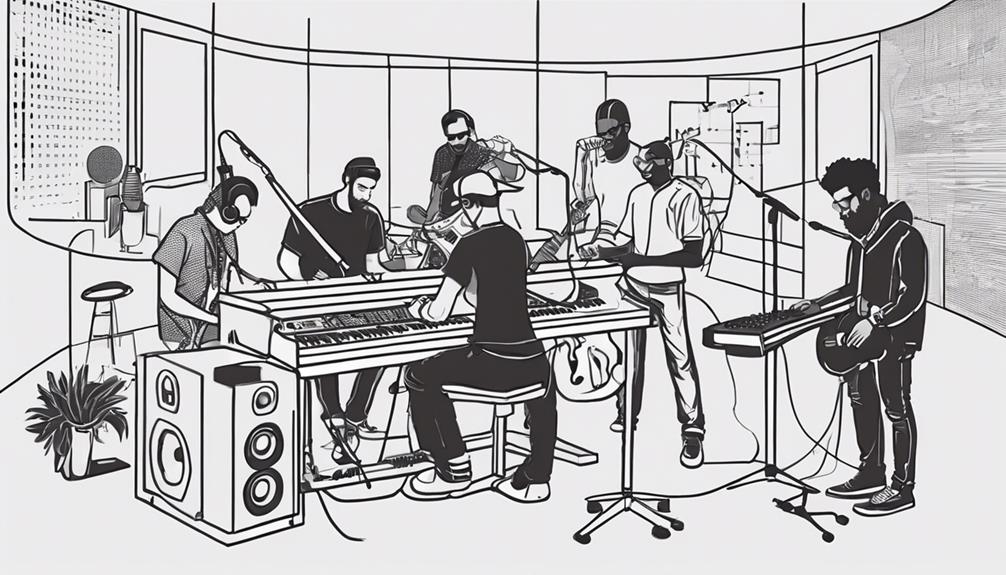
When defining your ideal client profile for music production, consider their preferences, target audience, and business needs.
Your focus should be on artists who resonate with your style and can afford your services for a mutually beneficial partnership.
Crafting personalized pitches tailored to solving their music production needs will help attract these ideal clients to your services.
Client Preferences
Crafting a detailed ideal client profile involves focusing on specific genres or types of artists that resonate with you the most. Whether it's pop, rock, hip-hop, or electronic music, understanding your ideal client's music style is essential to tailoring your services effectively. Consider factors such as communication preferences and project timelines. Knowing how your ideal client prefers to communicate, whether through emails, phone calls, or in-person meetings, can enhance collaboration.
Reflect on past successful collaborations to pinpoint characteristics of your ideal client. This analysis can help you attract the right clients and streamline your marketing efforts. By aligning your ideal client profile with your preferences and strengths, you increase the likelihood of finding clients who are the perfect fit for your music production services.
Target Audience
To define your ideal client profile for music production, consider factors such as music genre, budget, and level of experience. Understanding the specific needs, preferences, and challenges of your ideal client is essential for tailoring your services effectively.
Creating a detailed persona that includes demographics, psychographics, and buying behavior can help you target your client base more accurately. Focus on building relationships with clients who align with your ideal client profile to maximize satisfaction and retention rates.
Business Needs
Identify your ideal client profile for music production by analyzing factors such as music genre, budget, and project scope. Understanding the demographics, preferences, and needs of your ideal clients is vital for attracting them to your recording studio.
Tailor your marketing efforts towards clients who value quality music production services and are willing to pay accordingly. By determining the type of clients you enjoy working with, you can create a detailed ideal client avatar to streamline your client acquisition strategies.
Consider enhancing your online presence to reach a wider audience of potential clients, showcasing your skills and expertise as music producers. Focus on targeting clients who align with your business needs, ensuring a mutually beneficial relationship that fosters growth and success in the music production industry.
Pricing Strategy
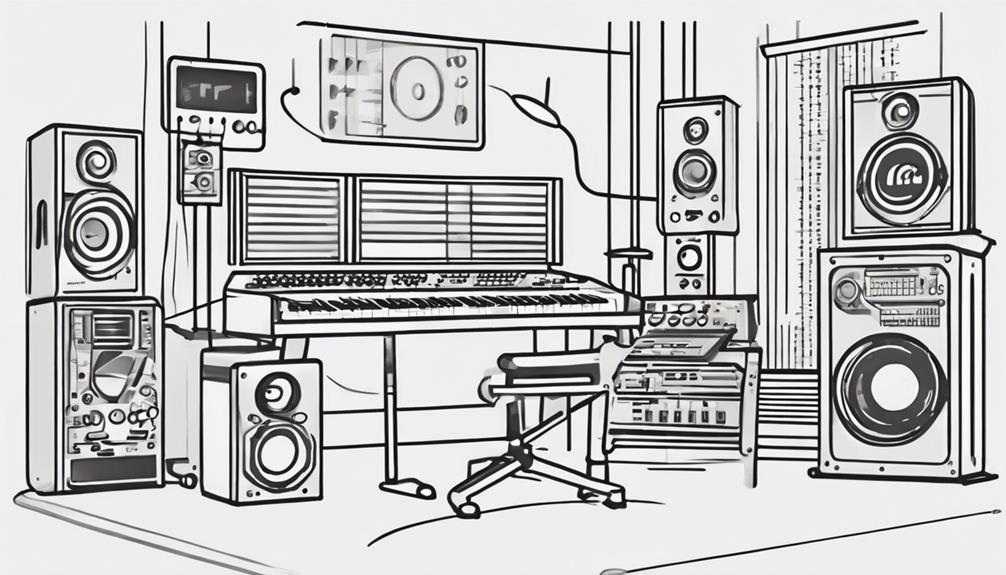
Researching market rates is essential for setting competitive prices in music production, ensuring you establish value and attract clients who appreciate your expertise.
When devising your pricing strategy for your production studio, consider the value you provide to clients and the rates prevalent in the industry. Avoid underpricing your services to attract new clients, as this may undervalue your work. Instead, focus on setting fair prices that reflect your skills and experience.
Consider offering bulk rates or discounts for multiple projects to incentivize long-term client relationships. It's vital to adjust your rates over time based on your growing expertise, skills, and client feedback. This not only reflects your value but also helps attract clients who recognize the quality of your services.
Personal Website Benefits
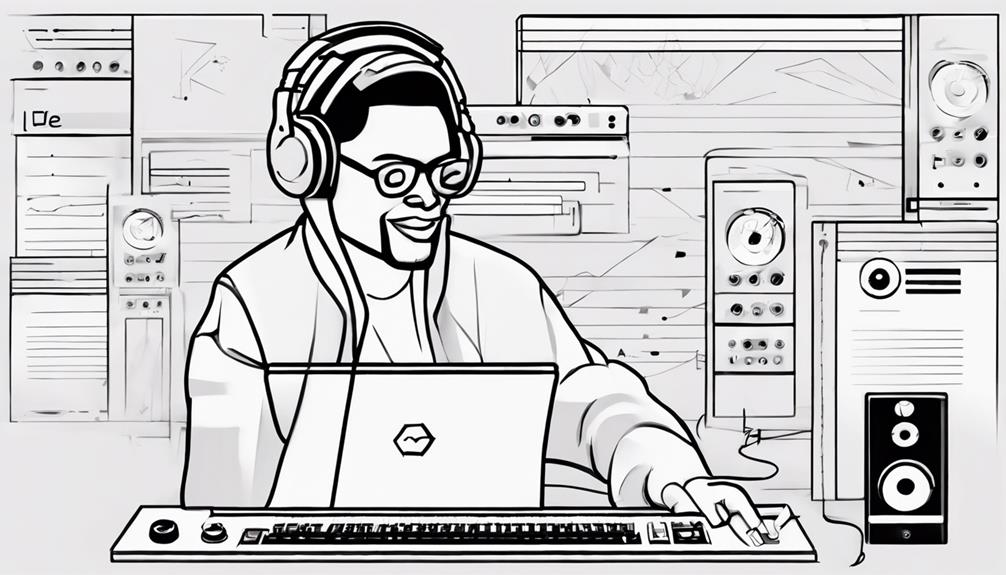
Consider enhancing your music production business by leveraging the benefits of having a personal website. A personal website serves as a centralized platform to showcase your portfolio, services, and contact information, making it easier for potential clients to find and learn more about your music production offerings.
By implementing good SEO practices, your personal website can help generate leads and enhance your online visibility. Additionally, your website can be utilized to share testimonials, samples of your work, and client success stories, further solidifying your credibility and professionalism in the music production industry.
With a personal website, you can effectively establish a strong online presence that showcases your expertise and attracts new clients who are seeking high-quality music production services. Utilize this powerful tool to not only display your work but also to connect with a wider audience and grow your client base.
Online Marketplace Advantage
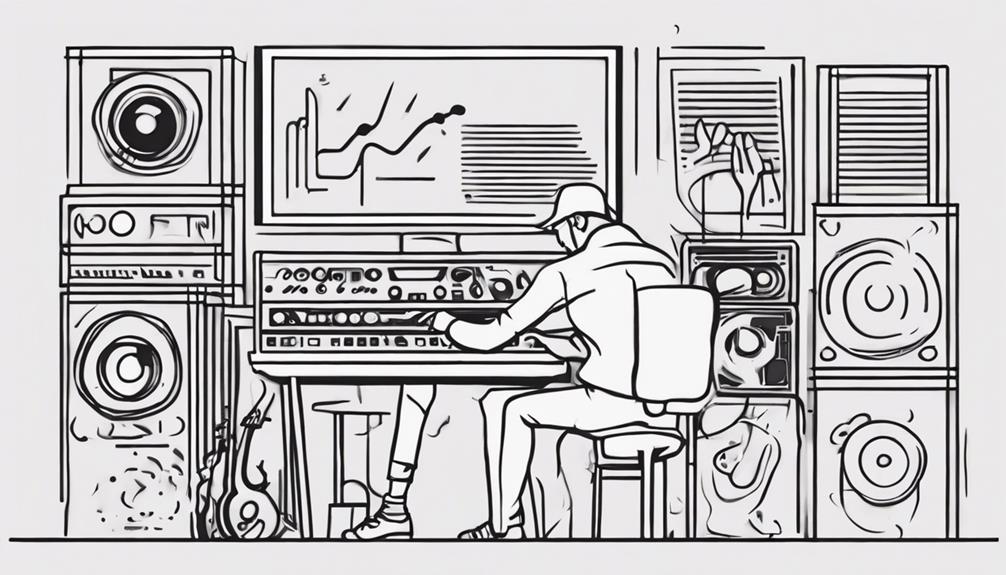
Exploring online marketplaces can provide music producers with a competitive advantage in reaching a global clientele and expanding their business opportunities. Platforms like SoundBetter and Airgigs offer a diverse array of services, from songwriting to mixing and mastering, allowing music producers to showcase their portfolios and set their rates.
By utilizing these online marketplaces, music producers can directly communicate with potential clients, enabling them to establish professional relationships efficiently. Clients, on the other hand, benefit from the ability to browse through music producers' profiles, listen to samples of their work, and read reviews from previous projects before making a hiring decision.
This transparency and accessibility make online marketplaces a convenient and effective tool for both music producers looking to find new clients and clients seeking high-quality music production services. Leveraging these platforms can greatly enhance a music producer's visibility and opportunities for securing projects.
Social Media Strategy
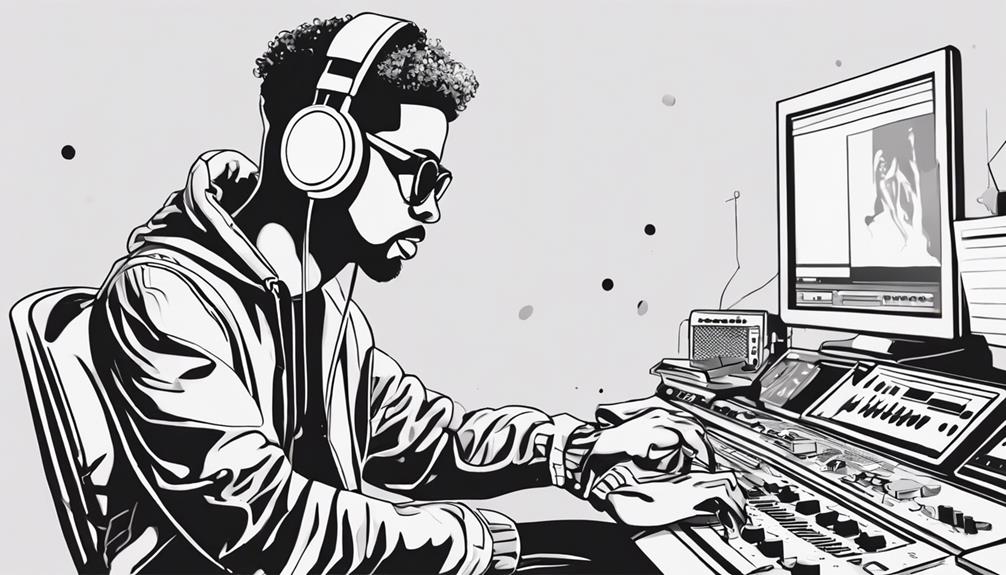
To further expand your client base and enhance your visibility as a music producer, implementing a strategic social media approach is crucial. Utilize platforms like Instagram, Facebook, and Twitter to showcase your work and reach potential clients effectively.
Engage your audience by sharing behind-the-scenes content, music production tips, and client testimonials to build credibility and foster connections. Additionally, make use of targeted advertising on social media to reach specific demographics interested in music production services, maximizing the impact of your promotional efforts.
Collaborating with influencers and music industry professionals on social media can also help expand your reach and enhance your credibility within the industry. By leveraging social media analytics, you can track engagement metrics, adjust your strategies accordingly, and optimize your client acquisition efforts for better results.
Stay proactive in monitoring your social media performance to make certain you're consistently attracting and converting potential clients.
Collaboration Opportunities
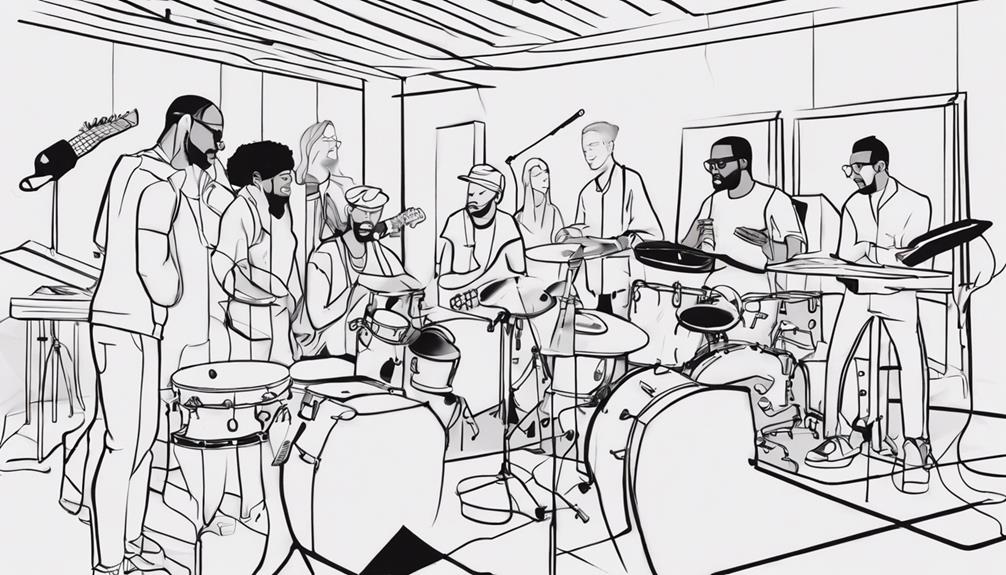
Engage with local artists and industry professionals to explore collaboration opportunities that can expand your client base and network in the music production field. Collaborating with local artists not only allows you to showcase your skills but also opens doors to new client opportunities.
Additionally, participating in industry events and conferences provides a platform to connect with potential clients and establish valuable collaborations. Offering to work on diverse projects with established artists is another effective way to attract new clients and expand your portfolio.
Moreover, joining online music production communities can offer a wealth of collaboration opportunities with like-minded professionals who share your passion for music production. Building relationships with music agencies and sync agents can also lead to collaborative projects and valuable client referrals.
Local Networking Events

To make meaningful connections and expand your client network in music production, take advantage of local networking events in your area. These events provide a platform to interact with local bands, industry professionals, and prospective clients within the music scene. By attending networking events, you open doors to collaborations, referrals, and potential client acquisitions.
Face-to-face networking allows you to build personal relationships and establish trust within the local music community, which can be invaluable for your career growth.
At these events, you may find workshops, showcases, and panels where you can showcase your skills and expertise to a targeted audience. Building a presence at local networking events not only helps in expanding your reach but also aids in establishing your reputation and credibility as a music producer.
Make the most of these opportunities to connect, engage, and leave a lasting impression on those in your local music network.
Frequently Asked Questions
How to Get More Clients as a Music Producer?
To get more clients as a music producer, reach out to artists with under 100k followers, craft personalized pitches, create engaging content, utilize Facebook advertising, and highlight your success on Spotify. Offer affordable rates to attract clients.
How to Find Music Producers to Work With?
Looking to collaborate with music producers? Start by exploring online platforms like SoundBetter and Airgigs for connections. Join social media communities and attend music events to network. Reach out to artists and search directories for potential partners.
How to Get Work as a Music Producer?
To get work as a music producer, reach out to indie artists with under 100k followers, craft personalized pitches, use social media to target audiences, and offer open communication. Showcase your value and solve clients' needs.
How to Find Artists to Work With Music Producers?
To find artists to collaborate with, seek independent singers & rappers with under 100k followers. Offer your production services to artists who match your style. Showcase your skills and provide appealing pitches to attract clients and form lasting partnerships.
Conclusion
So, now that you've honed your skills and identified your market, it's time to put yourself out there and find those clients for your music production work. Start by building an online presence through a professional website and social media platforms where you can showcase your portfolio and previous work. Leverage targeted advertising and networking opportunities to connect with potential clients and market music production effectively to the right audience. Consistently engaging with your niche community will further enhance your visibility and establish your reputation as a reliable music producer.
Did you know that 61% of music producers say that networking is the most effective way to find clients?
So, don't be afraid to attend local events, utilize online platforms, and showcase your work on social media to attract your ideal clients and grow your business!

